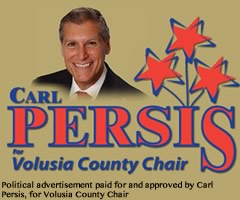
NEW SMYRNA BEACH -- With the RNC and DNC conventions over, the presidential campaign escalates as the nominees battle for victory in November. When the results are in, will the voters stick with President Barack Obama or move on to a new president in Mitt Romney?
While President Obama is striving to recapture the spirit of 2008 in his bid for a second term, this is tough going. 2012 is less like the election of 2008 and more like that of 1980. The voters then replaced one term President Jimmy Carter with Ronald Reagan, who asked “Are you better off today than you were four years ago?”
For those who may be too young to remember the 1980 election environment, America’s economy was sick. Voters were faced with interest rates in the stratosphere, a dismal unemployment rate, raging inflation, a poorly performing stock market, a weak housing market, American diplomats held hostage in Iran and more. President Carter appeared clueless and incompetent in his attempts to deal with the problems.
Election year 2008 was very different. There was no incumbent. Obama had the momentum, money and little record for which to answer. He was mostly known for his star-turn speech at the 2004 Democratic Convention and a couple of “autobiographies” praised by people who seemed not to have closely read them.
As the campaign began in 2007, the extent of the housing market crisis was not yet known, the stock market was still stable and people had jobs. However, they were tired of years of war, and in 2006 had given Congressional Republicans the boot for not addressing debt and spending.
Much of the media breathlessly promoted Mr. Obama and did not vet the history, beliefs and associations that shaped him as a man. Those who did were ignored at best and mocked or called liars at worst. Many people were voting for a man based on what they wanted to see, whose staff labored to downplay alarming but pertinent information and demonize those who questioned as racist.
Then there was his opponent. Aging war hero Senator John McCain stumbled many times as a candidate and seemed to lack motivation and a cohesive, compelling message. His pick of Sarah Palin as running mate added excitement for many Republicans, but she was not able to add enough to make the sale. She, too, was mocked and demonized. The Obama team argued that a McCain presidency would be a continuation of the Bush administration and people were weary of Bush.
In the critical weeks before the election, the economy took a deep dive. McCain was not able to communicate that he understood what was happening and knew how to correct the damage.
Though the vague promises of “hope and change” were not defined with specifics except for a few slips of the tongue, such as “we need to spread the wealth around,” it didn’t seem to matter. The rhetoric about oceans receding and the planet healing was appealing, even to some bright people usually not so undemanding of clarity.
Mr. Obama campaigned as an energetic, youthful man with promises of reducing the “disgraceful” national debt, ending unpopular wars and strengthening the financial well-being of the nation and its citizens. Without explaining how, he convinced a lot of voters that he knew how.
Thinkers and historians ponder why so many voters divined this understanding from his background as community organizer, law teacher and author of books describing his personal history. Was there something magical about him and his words? Even some who questioned his ideology or worried about lack of preparation and experience to be president were willing to give this “new kind of leader” a chance.
As a child of a white mother and black father, Obama would lead a post-racial America to live up to its most principled promise. White guilt and black anger over our nation’s racist history would disappear. Political rancor and divisiveness would end. In many fine speeches, he promised us so.
In 2012, people know what an Obama administration looks like, and those distressed by it are committed to making a change. He has a record he must run on, and to many voters, it’s neither pretty nor competent. A sound economy, lower unemployment and reduced debt? Nope, they are all worse. The end of partisan and racial division? Far from it; it’s worse. And, we are still in a messy war in Afghanistan.
Despite his ongoing efforts to blame every negative on the old Bush administration and Republicans, this president speaks and acts as though he and his team plan daily how to further divide the people he is pledged to represent as one nation. The charming candidate Obama has shown his arrogant and ruthless side as president, and he’s made many decisions costing the American people dearly.
It’s a stretch that this administration or its campaign team and supporters can build a credible case that Americans are better off today than four years ago. After so much time, the excuses of “we didn’t know how bad it was,” “it’s Bush’s fault” and “our policies need time to kick-in” sound lame and weak.
In 1980, Ronald Reagan used the “Are you better off than you were four years ago?” question to solidly whip a sitting president, and it’s as valid today as it was then. Indeed, despite the gloomy economy, President Carter was ahead in the polls at this time of the year. Then candidate Reagan began driving the message home in debates and campaign ads. The power of the message was immense.
With President Obama’s stats now on the board and his beliefs, conduct of the office and failure to deliver well-known to the American people, we are at different place than in 2008. It’s 1980 all over again.
With approximately two months to go until the election, anything can happen. Mistakes can be made, new information discovered, the economy improve or further decline, and world events intrude.
However, as always, it turns on who turns out to vote. The polls could be absolutely wrong. We won’t have that information until the election is over, and as is often said, that’s the only poll that counts.
We may not end up with an outcome similar to 1980, but this election has much more in common with that one than 2008, just four years ago.
Headline Surfer is Florida's first 24/7 Internet newspaper launched April 7, 2008, initially as NSBNews.net. It is based in New Smyrna Beach, covering Volusia County and throughout the Orlando Metropolitan Area via HeadlineSurfer.com, NSBNews.net and VolusiaNews.net. "Headline Surfer" is a registered trademark owned by NSB News LLC, for editorial, marketing and advertising purposes. All rights reserved.








